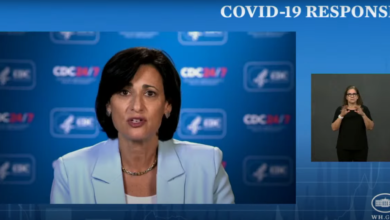12-week gap between COVID-19 vaccine doses should be ‘urgently reviewed,’ UK doctors say

[ad_1]
A group of doctors in the United Kingdom is urging the country’s government to scrap its decision to have those who have received a first dose of the Pfizer-BioNTech coronavirus vaccine wait up to 12 weeks before receiving the second jab, as “no other nation has adopted the U.K.’s approach,” one doctor said.
The British Medical Association over the weekend urged England’s chief medical officer to “urgently review the U.K.’s current position of second doses after 12 weeks,” as the Pfizer-BioNTech has said the second dose of its jab should be received after 21 days.
In a statement, the association said there was “growing concern from the medical profession regarding the delay of the second dose of the Pfizer-BioNTech vaccine as Britain’s strategy has become increasingly isolated from many other countries.”
“No other nation has adopted the U.K.‘s approach,” Dr. Chaand Nagpaul, chairman of the BMA council, told the BBC, per the Associated Press.
NJ EXPANDS COVID-19 VACCINE TO SMOKERS BUT TEACHERS, OTHER ESSENTIAL WORKERS KEPT WAITING
“I do understand the trade-off and the rationale, but if that was the right thing to do then we would see other nations following suit,” he added, noting that the country’s policy breaks not only with the manufacturer’s recommendations but those of the World Health Organization (WHO) as well.
The U.K. adopted the policy in an effort to speed vaccination efforts, a process that is dragging in the U.S. The country’s rationale behind the 12-week policy, in part, is to give as many people as possible the first dose of vaccine. Current estimates show that nearly 6 million people in the country have received a shot of either a vaccine made by Pfizer-BioNTech or one developed by U.K.-Swedish pharmaceutical giant AstraZeneca and Oxford University.
While AstraZeneca has said it believes a first dose of its vaccine offers protection after 12 weeks, Pfizer has warned it has not tested the efficacy of its jab after such a long gap.
Yvonne Doyle, medical director of Public Health England, defended the decision as “a reasonable scientific balance on the basis of both supply and also protecting the most people.”
COVID-19 VACCINE SUPPLY ‘PREDICTABILITY’ UNDER BIDEN IS SOLVABLE PROBLEM, HEALTH CARE CEO SAYS
Researchers in Britain have begun collecting blood samples from newly vaccinated people in order to study how many antibodies they are producing at different intervals, from 3 weeks to 24 months, to get an answer to the question of what timing is best for the shots.
The news comes as the country has identified a mutated strain of the coronavirus, known as B.1.1.7. Though it originated in the U.K., the strain has now been identified in more than a dozen U.S. states, with the Centers for Disease Control and Prevention (CDC) reporting that nearly 200 cases of the mutation.
Recently, government medical advisers said there was evidence that the new variant carries a greater risk of death than the original strain. Researchers knew the strain was more transmissible, but up until now did not think it caused more severe illness or a greater risk of death.
CLICK HERE FOR COMPLETE CORONAVIRUS COVERAGE
Still, more research on the B.1.1.7 strain is needed, with the U.K.’s Chief Scientific Adviser Patrick Vallance saying ahead of the weekend that “the evidence is not yet strong” on whether the new strain is indeed more deadly.
Overall, Britain has recorded 97,329 deaths among people who tested positive, the highest confirmed virus toll in Europe and the fifth-highest in the world.
The Associated Press contributed to this report.
[ad_2]
Source link





